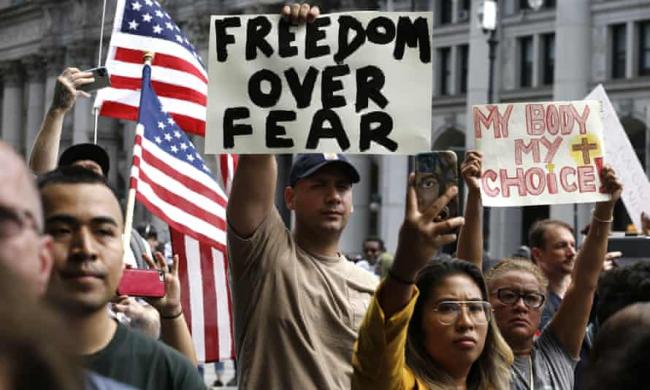Articles Menu

Aug. 13, 2021
It’s easy to laugh at the anti-vaccine movement, and this week they made it easier still. Hundreds of protesters tried to storm Television Centre in west London, apparently unaware that they were not at the headquarters of the BBC or its news operation – which they blame for brainwashing the British public – but at a building vacated by the corporation eight years ago and which now consists of luxury flats and daytime TV studios. If only they’d done their own research.
Anti-vax firebreather Piers Corbyn was there, of course, unabashed by the recent undercover sting that showed him happy to take £10,000 in cash from what he thought was an AstraZeneca shareholder, while agreeing that he would exempt their product from his rhetorical fire. (Corbyn has since said that the published video is misleading.) “We’ve got to take over these bastards,” he said during this week’s protest, while inside Loose Women were discussing the menopause.
In Britain, the temptation is to snigger at the anti-vaxxers, but in the US it’s becoming ever clearer that the outright Covid deniers, vaccine opponents and anti-maskers – and the hold they have over the Republican party – are no joke. The Covid culture wars have escalated to such an extent that the Republican governors of two states, Florida and Texas, are now actively barring schools, colleges and local authorities from taking basic, common-sense measures against the disease.
They are no longer allowed to require vaccines, proof of vaccination, a Covid test or masks. Any Florida school administrator who demands the wearing of masks could lose their pay. Texas is dropping the requirement that schools even notify parents when there’s a coronavirus case in class. Naturally, the Covid numbers in both states are through the roof. For all Joe Biden’s early success with vaccination, this level of resistance is posing a grave threat to the US’s ability to manage, let alone defeat, the pandemic.
What explains this level of Covid denialism? In the US, the roots of a “don’t tread on me” libertarianism that regards any instruction from government as a step towards tyranny run deep. In the Trump era, it has become a matter of political identity: a refusal to believe Covid is real or that the measures against it are legitimate are increasingly conditions of membership of the right and of good standing as a true devotee of the former president. They are conditions of membership. Besides, Covid denialism offers the lure of all conspiracy theories: the promise of secret knowledge, the chance to see what the sheeple cannot see.
For everyone else, it’s tempting to take pride in being untainted by such thinking. To dismiss the Covid deniers, whether in Florida or west London, as a group apart, irrational, if not downright stupid – refusing to take the steps that will provably protect them, their families and those around them. And yet, the distance between them and everyone else might not be as great as you think.
On the same day that Piers and the placard wavers were out in force in White City, the Intergovernmental Panel on Climate Change delivered its report on the state of our planet. It was its starkest warning yet. The UN secretary general, António Guterres, called it a “code red for humanity”, adding that the “alarm bells are deafening”. The IPCC found that sea level is rising, the polar ice is melting, there are floods, droughts and heatwaves and that human activity is “unequivocally” the cause.
Now, there are some who still deny this plain truth, the same way that some insist coronavirus is a “plandemic” hatched by Bill Gates or caused by 5G phone masts or aliens. Both those groups are guilty of cognitive denial, failing to update their beliefs in the light of the evidence.
But there is another form of denial, what the philosopher Quassim Cassam calls “behavioural or practical denialism”. This is the mindset that accepts the science marshalled by the IPCC – it hears the alarm bell ringing – but still does not change its behaviour. It can operate at the level of governments: note the White House official who on Wednesday urged global oil producers to open up the taps and increase production, so that hard-pressed US motorists can buy gasoline more cheaply. And it lives in individuals, too, in the fatalism that says one person can do nothing to halt a planetary emergency, so you might as well shrug and move on. Which is “to act in the same way as if you were a climate change denier,” says Cassam. “The practical upshot is the same.”
Whether it’s Covid or climate, there is a common defect at work here. It is wilful blindness, a deliberate closing of the eyes to a reality that is too hard to bear – and it afflicts far more than a hardcore of noisy sceptics and protesters. A US poll this week found that a summer of heatwaves, flooding and wildfires – evidence that the planet is both burning and drowning – has barely shifted attitudes to the climate issue. Many, even most, are looking the other way.
Perhaps all this is worth bearing in mind as policymakers grappling with the twin crises try to cajole the wary towards action for both their own and the collective good. In both cases, it pays to peel the committed deniers away from those who are merely hesitant or apathetic, and therefore more persuadable. And, again in both cases, it’s wise to remember that the recalcitrant are driven by an impulse that is all too human: namely, fear.
[Top photo: A demonstration against vaccine mandates, New York City, 9 August. Photograph: John Lamparski/NurPhoto/REX/Shutterstock]